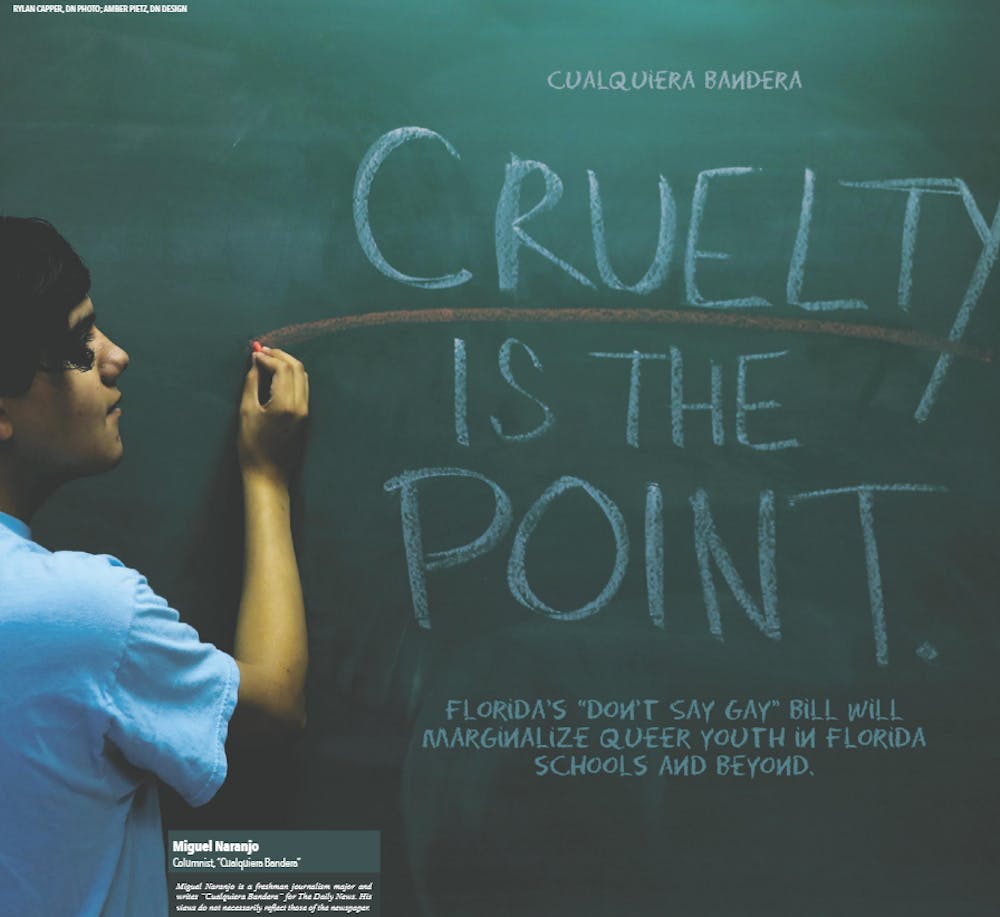Miguel Naranjo is a freshman journalism major and writes “Cualquiera Bandera” for The Daily News. His views do not necessarily reflect those of the newspaper.
When I was still in 10th grade, I found a book called “Same Love” by Tony Correia on the shelves of my school library. It was about a boy named Adam who was sent to a Christian camp to “straighten out” his “condition” when he was outed to his family. In that camp, every figure of authority tried to make Adam ashamed of his homosexuality, and that shame strained the relationships between him and everyone he knew and met.
Adam was just a character in a book, but even so, he was reflective of a real-world person, and his struggles reflective of real-world issues. Now, thanks to the Florida state legislature, more queer kids in Florida—and regrettably, beyond— will have to experience what Adam did.
On March 28, 2022, Florida Gov. Ron DeSantis (R-Fla.) signed HB. 1557 into law. Also officially called the Parental Rights in Education bill, the bill is designed to reinforce parents’ rights to control what their children are learning in schools.
Don’t recognize the name? Its opponents call it by another: the “Don’t Say Gay” bill.
Most of the amendments the bill makes to the public education section of the Florida education policy have to do with opening communications with students’ parents and making them fully aware of any changes to a student’s wellbeing, giving parents the agency to sue any school district that doesn’t respond to their concerns.
Among these amendments, the third paragraph sticks out like a sore thumb: “Classroom instruction by school personnel or third parties on sexual orientation or gender identity may not occur in kindergarten through grade 3 or in a manner that is not age-appropriate or developmentally appropriate for students in accordance with state standards.”
Proponents of HB. 1557 say that this bill empowers parents, letting them broach the subject of varying sexual orientations at a time that they feel is best for their child. However, on March 7, 2022, DeSantis berated a reporter during a press conference who said that the “Don’t Say Gay” bill prohibited instruction on sexual orientation and gender identity.
In this tirade, he said that the bill only says that for kindergarten through third grade, the reporter “pushes false narratives” and he and the Florida legislature are “...going to make sure that parents are able to send their kid to kindergarten without having some of this stuff injected into their school curriculum.”
If I need to spell it out, the appeal of this bill to conservatives at large is that it discourages discussion of topics relating to the LGBTQ community in the classroom, effectively removing the community from public perception. In the grand scheme of things, the “Don’t Say Gay” bill mimics the heavy hand with which conservative parents quash the topic in their own homes.
The issue is not that the topic of sexuality and/or gender identity is being mishandled. It’s that the topic is being handled at all.
DeSantis and the Republican-controlled Florida legislature are cashing in on bigotry and fear. While students hold walk-out protests and signal that the “Don’t Say Gay” bill threatens to marginalize LGBTQ children in schools, DeSantis garners favor with the population with the most value to him: the conservative population old enough to vote.
At the risk of sounding cynical, schoolchildren and their studies being politicized has had and is having horrific effects, but it’s not a new development.
About a year ago, conservative parents flooded school board meetings with complaints about Critical Race Theory (CRT), which argues that racism is embedded into legal systems and policies, according to EducationWeek. When they thought their children were being taught that the United States was founded on racism and white people are inherently privileged and oppressive, conservatives moved to oppose CRT.
Now, teachers have been scared out of teaching race in their classrooms, according to polling by Education Week.
Earlier this year, a wave of conservative parents started bringing complaints to school boards about books that their kids were reading for class and books that were available in school libraries. They read aloud provocative passages from those books about non-standard family dynamics and romantic dynamics, racial minorities experiencing violence and hardship and young people in sexual situations.
Now, teachers have been scared out of featuring authors with marginalized identities in their classrooms, also according to EducationWeek.
I hope the pattern is clear now. The “Don’t Say Gay” bill is one more act of censorship in a line of several: conservative parents aren’t happy that their kids are exposed to gay media, so now they’re scaring teachers out of teaching about the LGBTQ community in their classrooms. This entire movement is deconstructive; the intent is to stifle and ignore societal issues and changes instead of having to confront them.
The fact that the Florida legislature (or any state legislature, for that matter) is showing its support by exercising its power over public school curriculum is a grim omen for how much cultural effect this movement will have – or rather, how much cultural effect it will restrict.
“Same Love” may have been a storybook, but the people depicted in it and their circumstances are not fairytales. As someone who has grown up in the K-12 public school system before these restrictions, I fear that other kids won’t have the same chances I had to broaden their horizons and learn to live in a population with ever-growing diversity. After all, “The House on Mango Street” by Sandra Cisneros has long been challenged by school boards and, in some cases, banned for “its depictions of domestic and sexual violence,” which are not the focus of that book but instead support the overarching themes of adulthood, maturity and independence.
What is the “Don’t Say Gay” bill supposed to show kids in America? That the things we don’t want to talk about will go away if we shove our heads in the sand? Because, for as long as same-sex couples and transgender people call this country home, that will be wholly untrue.
And, for as long as conservatives want to pass legislature that erases them from students’ view, those kids will grow up to be intolerant of people who are different from them. DeSantis may have touted, moments after signing the bill, that he “...will make sure that parents can send their kids to school to get an education, not an indoctrination,” according to the Associated Press, but the cruel irony is that education allows a person to process the world around them – whether it's with numbers, words, facts or skills – and this bill will keep students from doing just that.
That’s not an accident, as much as it pains me to write it. Any parent would want to shield their child from something that would harm them. If they think that the LGBTQ community is a danger to their child – consciously or unconsciously – they’ll teach their kid to avoid it like the plague, even if that danger doesn’t truly exist and acting like it does would fuel divisiveness throughout the nation.
The legislature surrounding public school curriculum should serve to expand children’s worldview and make it easier for them to live in the world they’re growing up in. It’s not the legislature’s job to blind students to the reality they live in, even if their parents think that’s a good way to raise them.
Contact Miguel Naranjo with comments at miguel.naranjo@bsu.edu.





